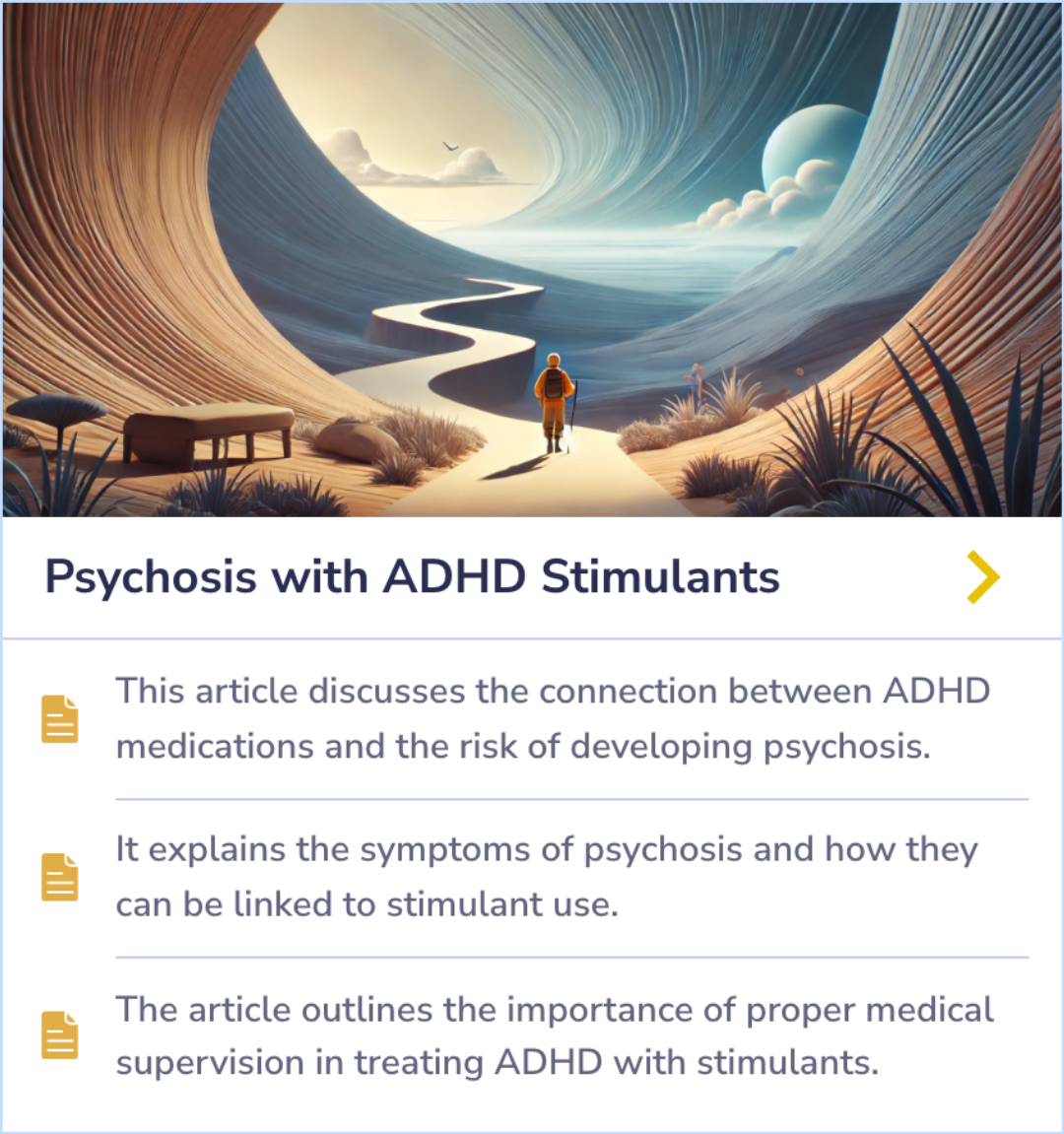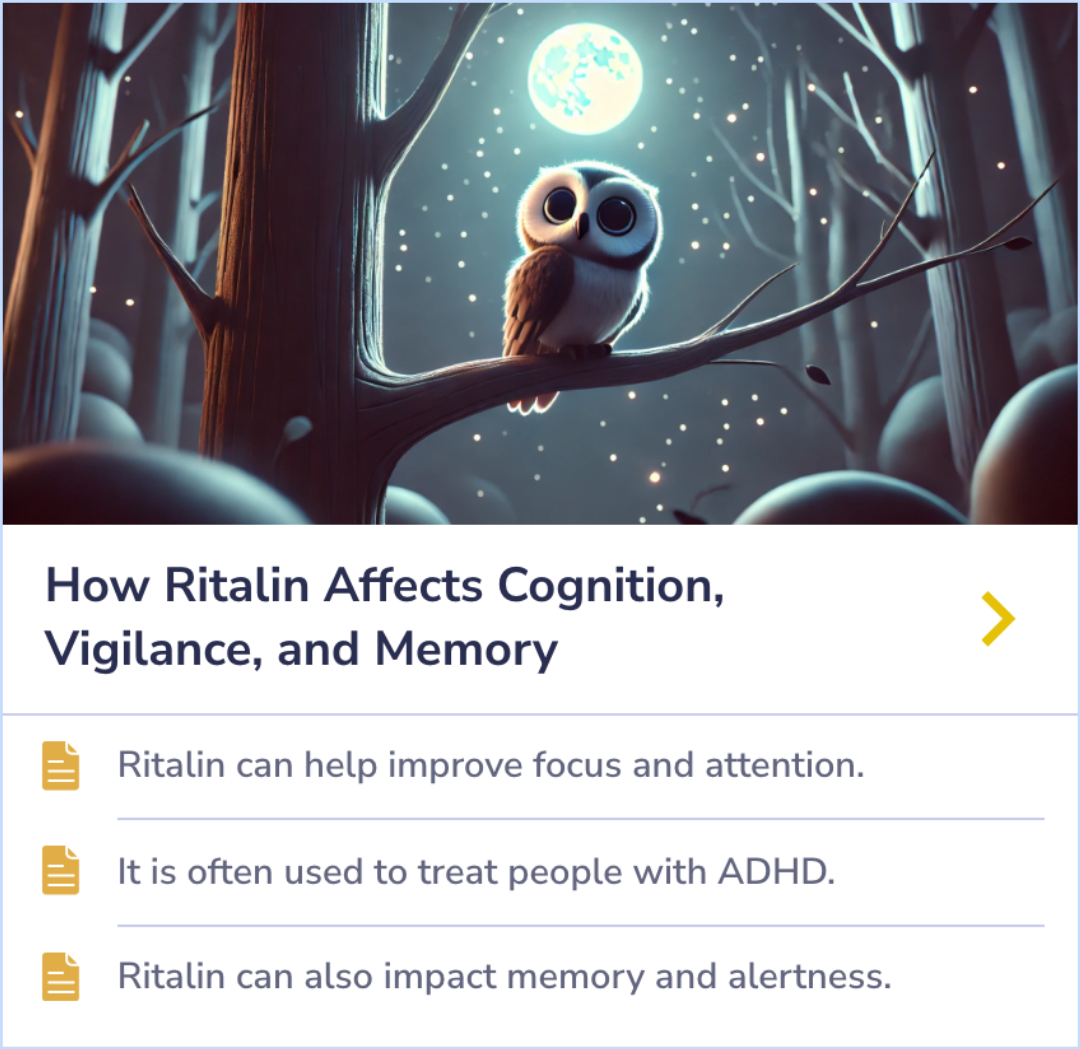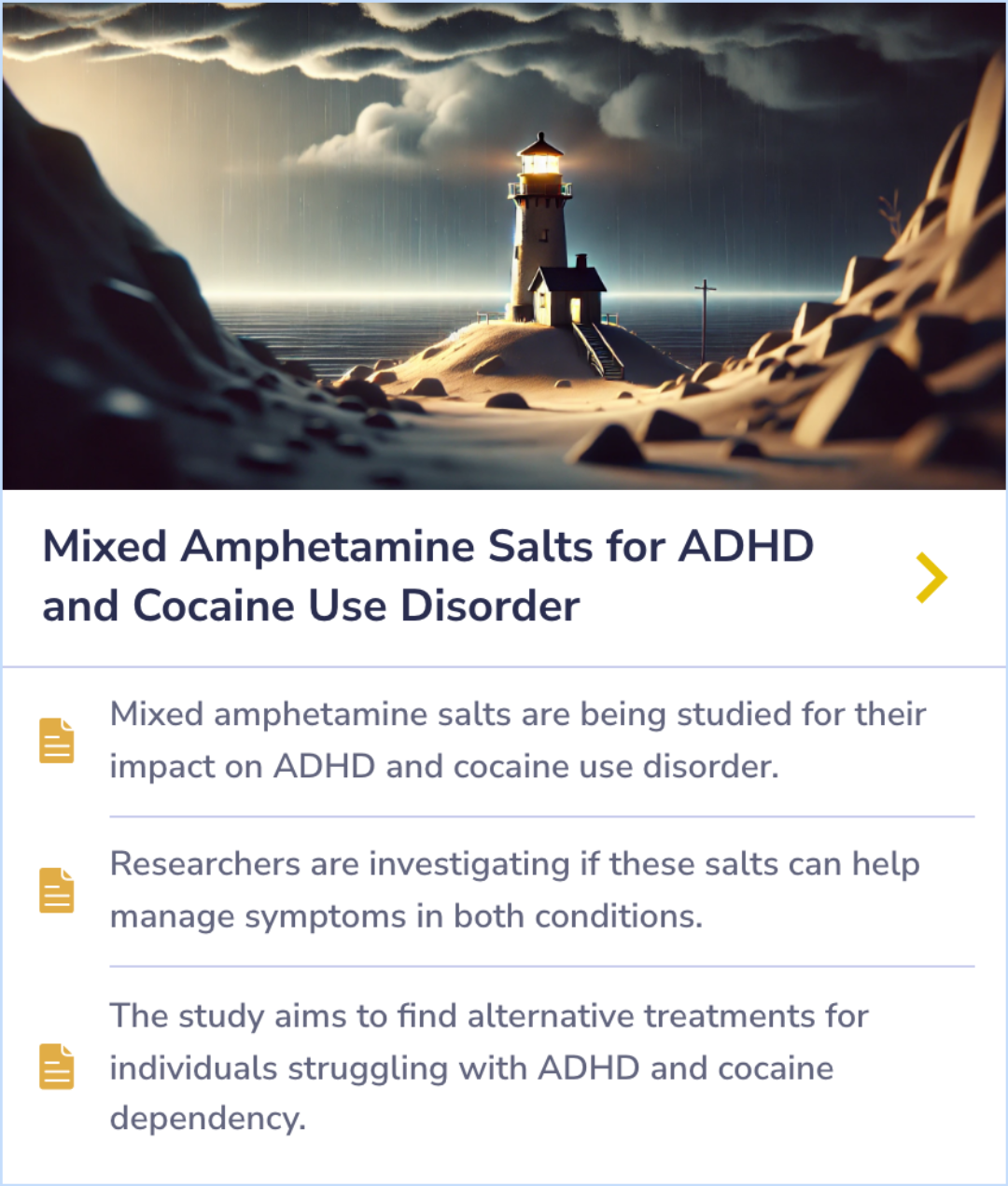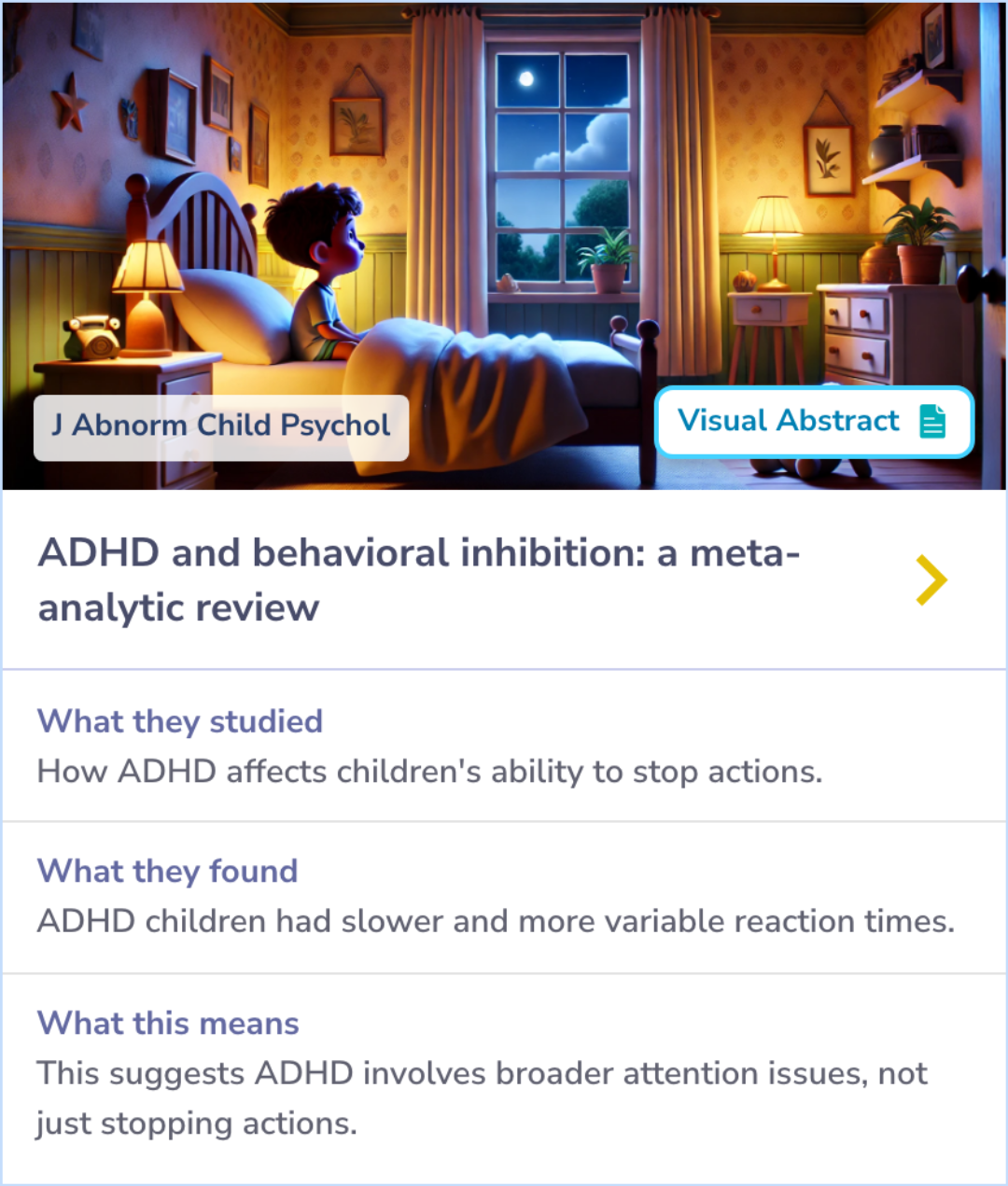Adderall
Evidence Based Answers
Can using Adderall damage your brain over time?
Long-term amphetamine use may pose neurotoxicity risks due to dopamine damage and oxidative stress, though human studies are still incomplete.
Published: October 24, 2024
Click to explore a section:
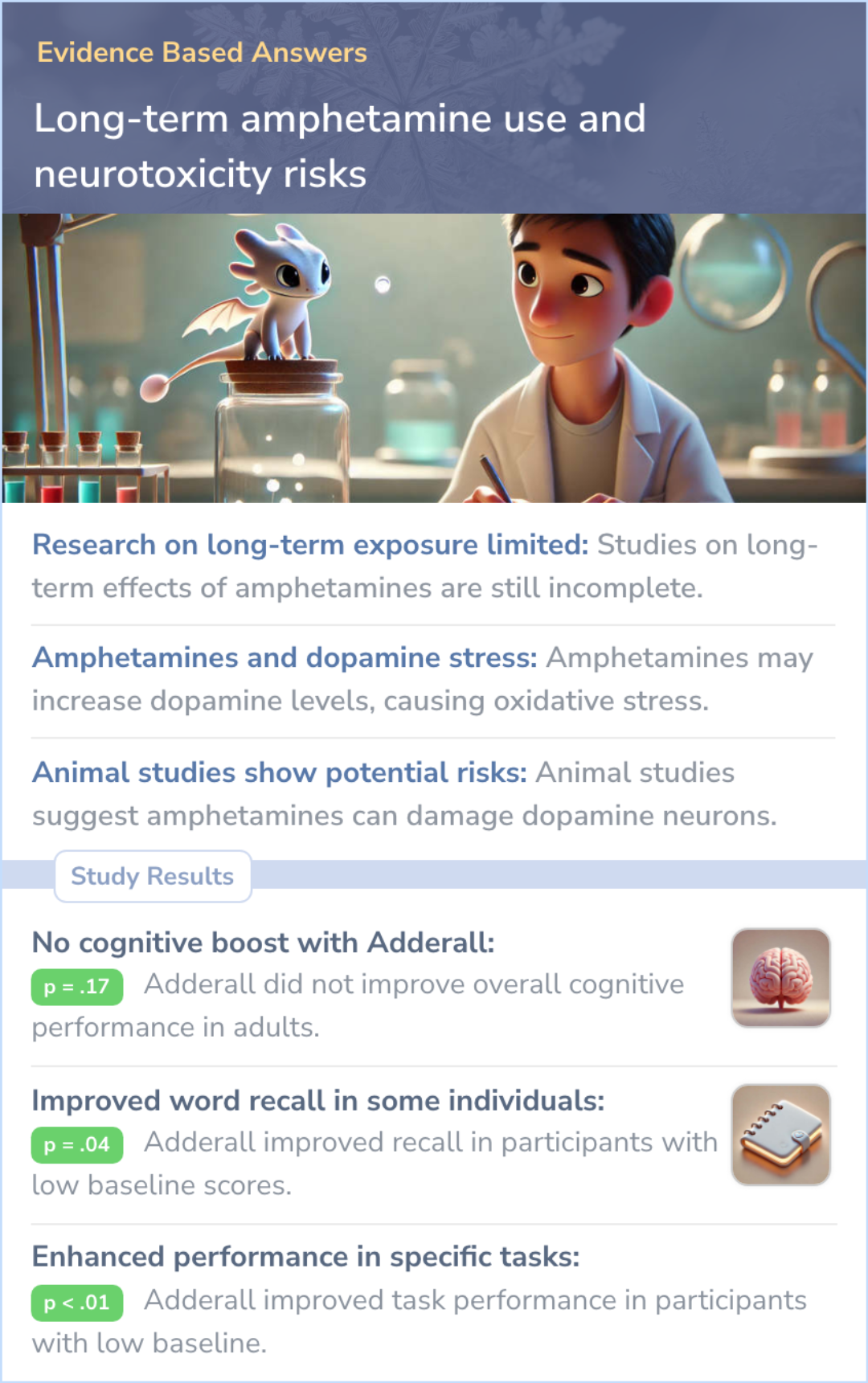
Amphetamines may cause brain damage due to oxidative stress, but human studies on neurotoxicity are incomplete.
Studies Summary
🧠
Concerns about Mental Health Risks
A large review of studies indicates that using amphetamines like Adderall may increase the risk of mental health issues such as psychosis, depression, and violence. The risk is even higher for people who use them frequently or have an addiction to them.
⚠️
Mortality Risks from Long-Term Use
Research shows that long-term amphetamine users face higher risks of death from causes like heart disease and drug poisoning compared to those who do not use amphetamines regularly.
🔬
Potential for Neurotoxic Effects
Amphetamines are known to increase dopamine levels in the brain, which might lead to damage over time. This potential neurotoxicity remains a concern, especially with prolonged use.
Highly Cited Studies
Long term Effects of Methylphenidate in Adults
Peer Reviewed Study 1
Amphetamine Use Linked to Increased Mental Health Risks
Peer Reviewed Study 2
Elevated Mortality Risks Linked to Long-Term Amphetamine Use
Peer Reviewed Study 3
Limited Cognitive Effects of Amphetamine in Healthy Adults and Perceived Enhancement
Background: Introduction: Long-Term Use of Amphetamines
Amphetamines, commonly used to treat ADHD, have been in medical use since the early 20th century. While effective, their potential for abuse and the long-term effects on the brain, particularly the risk of neurotoxicity, raise concerns. Prolonged stimulant treatment in adults with ADHD and narcolepsy has led to increased exposure.
Research on the effects of extended amphetamine exposure is limited, and the neurotoxic potential remains an area for further investigation.
Research on the effects of extended amphetamine exposure is limited, and the neurotoxic potential remains an area for further investigation.
“
Source Quotes:
Amphetamine stimulants have been used medically since early in the twentieth century, but they have a high abuse potential and can be neurotoxic. Effects of prolonged stimulant treatment have not been fully explored, and understanding such effects is a research priority.
Background: Mechanisms of Neurotoxicity: How Amphetamines Affect the Brain
The exact mechanisms behind amphetamine-induced neurotoxicity are not fully understood. Research suggests that amphetamines increase dopamine levels in the brain, leading to oxidative stress and potential damage to dopamine nerve terminals. This process may contribute to the neurotoxic effects observed in studies.
While animal studies have shown significant neurotoxic effects, translating these findings to humans requires further research.
While animal studies have shown significant neurotoxic effects, translating these findings to humans requires further research.
“
Source Quotes:
The mechanisms responsible for amphetamine-induced neurotoxicity have not been fully identified. However, accumulated evidence suggests that high levels of cytoplasmic dopamine associated with amphetamine-mediated disruption of vesicular storage lead to severe oxidative stress, which contributes to the damage to dopamine nerve terminals.
Chronic exposure to amphetamine, particularly methamphetamine, at recreational doses has shown to destroy dopaminergic terminals in the striatum through a variety of mechanisms, including oxidative stress and excitotoxicity.
Background: Animal Studies: Implications for Human Neurotoxicity
Animal studies have shown that high doses of amphetamines can cause neurotoxic damage to dopamine neurons, particularly in areas like the striatum. These findings raise concerns about potential risks for humans, especially with prolonged exposure to therapeutic doses of amphetamines.
However, there are significant differences between species, and the results from animal studies may not directly apply to humans, emphasizing the need for more research focused on human subjects.
However, there are significant differences between species, and the results from animal studies may not directly apply to humans, emphasizing the need for more research focused on human subjects.
“
Source Quotes:
Concerns have been voiced that, in addition to neurobiological adaptations, prolonged exposure to amphetamine could damage components of the central nervous system. These concerns arise, in part, from evidence that exposure of experimental animals to acute, high doses of amphetamine produces damage, generally referred to as 'neurotoxicity', to dopaminergic neurons.
Given the potential for profound species differences in susceptibility to stimulant-induced neurotoxicity, preclinical approaches may have limited utility in addressing questions relevant to clinical practice.
Background: Human Studies: What We Know About Neurotoxicity
In humans, the long-term effects of amphetamines on the brain are not fully understood. Studies using brain imaging have shown some changes in dopamine function, but the results are not consistent. The decline in striatal dopamine function with age further complicates the picture, making it difficult to determine whether long-term amphetamine use exacerbates this natural decline.
Current evidence suggests a potential risk of neurotoxicity, but more research is needed to understand the implications of long-term amphetamine use in adults.
Current evidence suggests a potential risk of neurotoxicity, but more research is needed to understand the implications of long-term amphetamine use in adults.
“
Source Quotes:
In humans, markers of striatal dopamine function decline with age. Nuclear medicine procedures have indicated that availability of the dopamine transporter in the striatum decline at a rate of 6 − 7% per decade.
There has been little research conducted in humans on this kinetic course using brain imaging, but it seems likely that the same rules apply.
Peer Reviewed Study
Study: Amphetamine Use Linked to Increased Mental Health Risks
The abstract reviews 149 studies on amphetamine use and mental health. Meta-analysis shows that any amphetamine use is linked to higher odds of psychosis, violence, suicidality, and depression. For those with amphetamine use disorders, the odds of these mental health issues are even higher.
While the abstract focuses on mental health outcomes, the connection between these and neurotoxicity may be significant, as prolonged exposure to amphetamines is associated with worsening mental health conditions.
While the abstract focuses on mental health outcomes, the connection between these and neurotoxicity may be significant, as prolonged exposure to amphetamines is associated with worsening mental health conditions.
author
McKetin R, Leung J, Stockings E, Huo Y, Foulds J, Lappin JM, Cumming C, Arunogiri S, Young JT, Sara G, Farrell M, Degenhardt L
journal
EClinicalMedicine
Date Published
2019 Oct 17
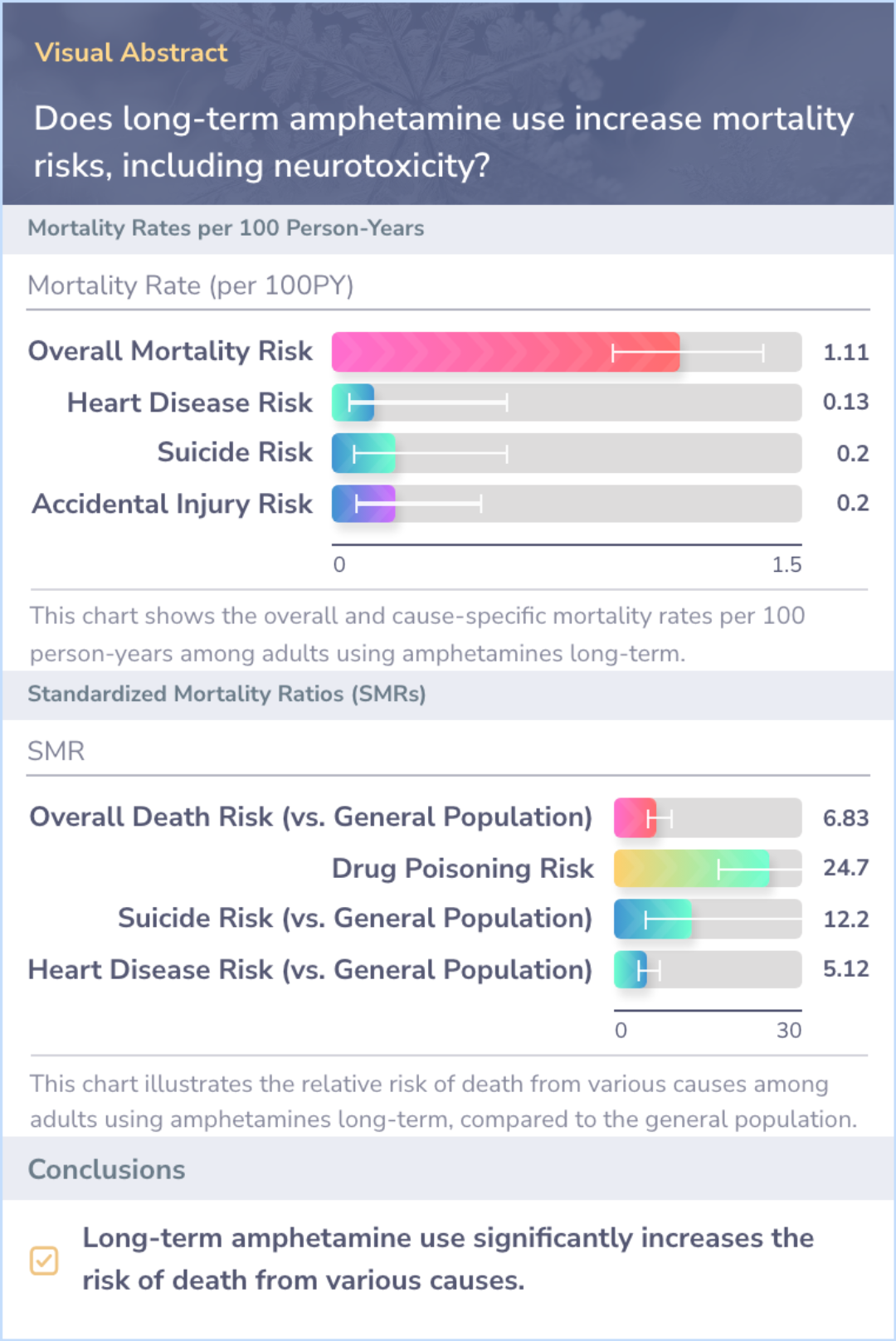
Peer Reviewed Study
Study: Elevated Mortality Risks Linked to Long-Term Amphetamine Use
This study conducted a meta-analysis of 25 cohorts to estimate mortality risks among individuals with regular or dependent amphetamine use. The study found elevated risks of various causes of death, including cardiovascular disease, drug poisoning, and suicide. These findings indicate a significantly higher risk of mortality among amphetamine users compared to those who do not regularly use these drugs.
The study pooled data from different countries and found that the all-cause standardized mortality ratio (SMR) was 6.83, indicating much higher mortality risks in this population.
The study pooled data from different countries and found that the all-cause standardized mortality ratio (SMR) was 6.83, indicating much higher mortality risks in this population.

Peer Reviewed Study
Study: Limited Cognitive Effects of Amphetamine in Healthy Adults and Perceived Enhancement
The abstract focuses on the cognitive effects of mixed amphetamine salts (MAS), such as Adderall, in healthy young adults. Despite the drug being widely used for cognitive enhancement, the study found no significant improvement in cognitive abilities in most participants. However, some participants perceived their performance as enhanced when using MAS, even though the results didn't support this belief.
These findings suggest that while MAS may not actually enhance cognition, users might still feel that it does, which could have implications for long-term use.
These findings suggest that while MAS may not actually enhance cognition, users might still feel that it does, which could have implications for long-term use.
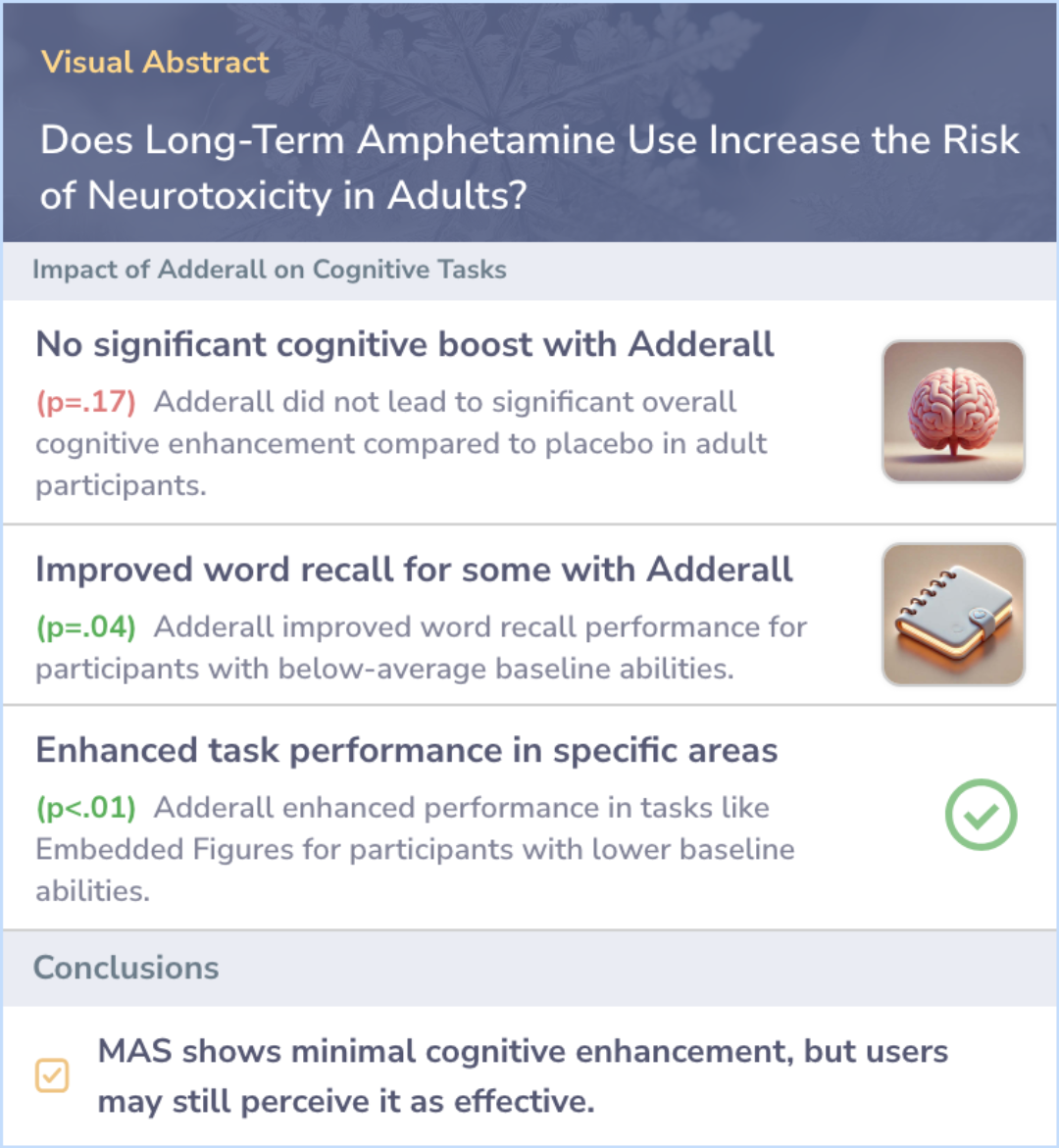
Key Takeaways
Conclusions
Research indicates that long-term use of Adderall, a mixed amphetamine salts medication, may present various mental health risks, including psychosis and depression, potentially linked to neurotoxicity. While studies on humans and animals suggest dopamine-related brain changes, precise effects remain unclear. The perceived cognitive enhancement by some users isn't supported by evidence, indicating a need for further study on prolonged usage.

Evidence Summary
ADHD Medications and Psychosis Risk
ADHD medications like Adderall can be linked to a heightened risk of psychosis. Symptoms such as hallucinations or delusions may appear with stimulant use, underscoring the necessity of careful medical supervision. Treatment plans must consider these risks to manage ADHD effectively.
While exploring medication risks, comparisons between human and animal studies highlight varying neurotoxic effects, prompting further research into human impacts.
While exploring medication risks, comparisons between human and animal studies highlight varying neurotoxic effects, prompting further research into human impacts.
Evidence Summary
Exploring Ritalin's Influence on ADHD and Beyond
Ritalin plays a substantial role in enhancing focus and attention, primarily prescribed for individuals with ADHD. Its influence goes beyond these areas, impacting memory and alertness, showcasing its broader cognitive effects. This aligns with concerns about long-term stimulant use, as observed in amphetamines, though Ritalin's specific effects are distinct in their scope and application.
Ritalin underscores the diverse applications and impacts of ADHD medications, expanding the understanding of cognitive enhancements beyond mere attention and focus, echoing broader themes explored in stimulant research.
Ritalin underscores the diverse applications and impacts of ADHD medications, expanding the understanding of cognitive enhancements beyond mere attention and focus, echoing broader themes explored in stimulant research.
Evidence Summary
Exploring Treatments: Amphetamine Salts for Dual Disorders
Research focuses on the use of mixed amphetamine salts as a possible treatment for both ADHD and cocaine use disorder. Scientists aim to determine whether these salts can efficiently manage symptoms for individuals affected by both conditions.
The study also seeks to explore alternative treatment options, examining if these salts offer viable solutions for those struggling with ADHD alongside cocaine dependency.
The study also seeks to explore alternative treatment options, examining if these salts offer viable solutions for those struggling with ADHD alongside cocaine dependency.
Evidence Summary
ADHD: Slower and Varied Reaction Times
Children with ADHD display slower and more varied reaction times compared to their typically developing peers. This suggests these children experience challenges with attention and cognitive processing. The comparison explores how the variability in response affects their ability to halt actions, rather than indicating a fault in behavioral inhibition itself.
The slide reinforces these findings by diving into how ADHD influences children's reaction times and highlights key differences in attention and processing between affected and typically developing children.
The slide reinforces these findings by diving into how ADHD influences children's reaction times and highlights key differences in attention and processing between affected and typically developing children.
